The 7 best drugstore shampoos
Select independently determines what we cover and recommend. When you buy through our links, we may earn a commission. Learn more.
Salon-quality shampoos are lovely — but they can be a splurge, some with prices as high as $50. If a $10 shampoo is more your budget, drugstores and major retailers like Target and Walmart have aisles and aisles of choices. So how do you choose the best drugstore shampoo? Select talked to dermatologists and hair-health experts about the pros and cons of drugstore shampoos, what ingredients to look for and what to avoid, and we rounded up some of the experts favorite shampoos available at most drugstores or major retailers so they won’t break your bank.
SKIP AHEAD The best drugstore shampoos, according to experts | How often should you wash your hair
What to look for in a drugstore shampoo
It's worth noting that there is a difference between affordable drugstore shampoos and more expensive options, according to the experts we spoke to. “Drugstore shampoos typically have more ‘filler’ ingredients like sulfates, excess water and chemicals,” according to hair health expert and trichologist Taylor Rose, who runs the popular @thehealthyhur TikTok account. (Trichologists are specialists who help with scalp problems, typically hair loss.) Salon-quality products, on the other hand, “tend to have more vitamins and minerals that are actually beneficial to the hair,” she said. In fact, most of the hair stylists we spoke to do not use, and therefore are not familiar with many drugstore shampoos.
Still, not everyone can or is willing to pay for higher end shampoo. Moreover, “with shampoos, like any hair product on the market, there really is no "one size fits all,” option, said Rose. The best thing you can do is understand your hair type, said Rose, and also look at the first five ingredients listed on the bottle, which “on average make up 97% of a product's volume,” said trichologist William Gaunitz.
In general though, here are a few rules to keep in mind:
“Gentle surfactants are good for cleaning,” said Dr. Hadley King, a board-certified dermatologist in New York. In shampoos, surfactants are the cleansing agent that help get rid of dirt, oil or residue. New York City-based trichologist and hair health expert Shab Reslan, an expert in our guide to the best fine hair shampoos, recommends looking for gentle cleansers like sodium lauryl sarcosinate or cocamidopropyl betaine. Gaunitz recommended coconut oil-derived surfactants as cleansers. Harsh cleansers to avoid include sodium lauryl sulfate, or sodium laureth sulfate, according to multiple dermatologists we spoke to.
Avoid potentially damaging “filler” ingredients like propylene glycol and formaldehyde, which can cause scalp inflammation, said Gaunitz.
If you have an oily scalp, salicylic acid and/or apple cider vinegar can be helpful ingredients, according to King, as they're good at removing that excess sebum (any oily substance produced by the scalp).
For dry or damaged hair, “look for a formulation that contains humectants, emollients and occlusives,” said King. In short, humectants draw moisture to your hair, emollients trap it in and occlusives provide a natural barrier to prevent moisture loss.
For dandruff, look for the ingredients pyrithione zinc or selenium sulfide, noted King.
If you have a sensitive scalp or sensitive skin, look for a paraben-free shampoo, said freelance makeup and hair stylist Francesca Maria Alfonso. Parabens are preservatives that can extend the shelf life of shampoo, but they can also irritate your scalp.
The best drugstore shampoos, according to experts
We rounded up shampoos sold at drugstores and major retailers that are recommended by dermatologists, trichologists and hair stylists that will keep your hair shiny and fresh without breaking the bank.
Garnier Whole Blends Smoothing Shampoo with Coconut Oil and Cocoa Butter Extracts
If your hair is dry and coarse, Alfonso recommended this Garnier option. “It’s smoothing, it has coconut oil and it’s paraben-free,” she said. Though this option is formulated with sodium laureth sulfate, a harsh detergent, Alfonso thinks it’s still a winner if you’re on a budget. Plus, “if you have a sensitive scalp or sensitive skin, using a paraben free shampoo is a really good course for you,” since parabens can irritate your scalp, she added. This Garnier shampoo has a 4.7-star average rating from over 7,000 reviews on Amazon.
Garnier Whole Blends Smoothing Shampoo with Coconut Oil and Cocoa Butter Extracts
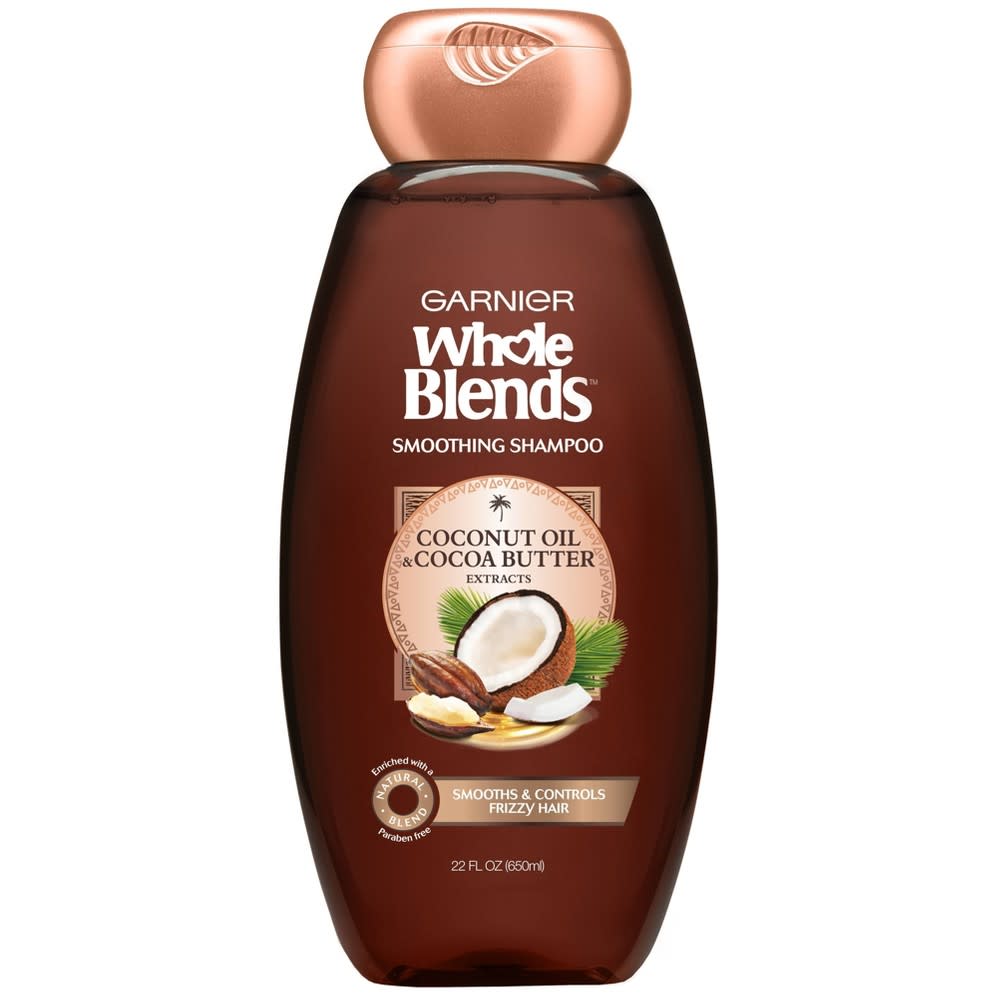
Garnier Whole Blends Smoothing Shampoo with Coconut Oil and Cocoa Butter Extracts $ at Walgreens
Garnier Whole Blends Smoothing Shampoo with Coconut Oil and Cocoa Butter Extracts $ at Target
Dove Hydration Spa Shampoo
If your strands are dry and brittle, moisturizing ingredients like a hyaluronic serum (which is also a skincare staple) may help hydrate your hair, said King. She liked this Dove option, which we also recommended in our guide to the best shampoos for every scalp and hair type. When paired with Dove’s Hydration Spa Conditioner, the set “leaves my hair feeling soft and moisturized without feeling oily or weighed down,” she said. And the shampoo uses the gentler cleanser cocamidopropyl betaine instead of a harsher sulfate. This Dove option has a 4.2-star average rating from over 500 reviews on Amazon.
Dove Hydration Spa Shampoo
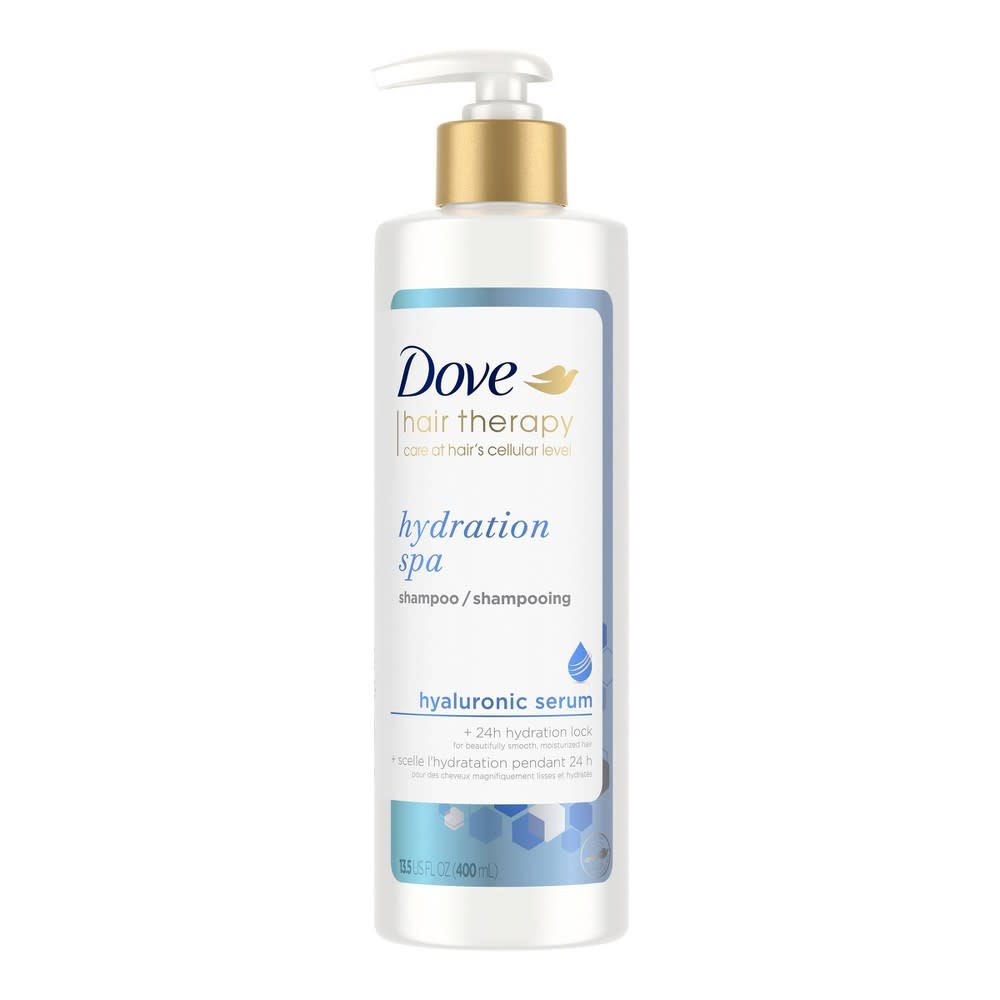
Dove Hydration Spa Shampoo $ at Target
Dove Hydration Spa Shampoo $ at Walgreens
Dove Hydration Spa Shampoo $ at Amazon
Shea Moisture Manuka Honey and Mafura Oil Intensive Hydration Shampoo
Both King and Rose recommended the Shea moisture line as a great drugstore option for drier hair. This sulfate-free option, formulated for dry, curly hair, contains certified organic raw shea butter, as well as manuka honey and mafura oil to hydrate and moisturize the hair, said King. It’s “great for dry and frizzy hair,” and one of the ingredients, African rock fig “is rich in antioxidants to help protect from damage from free radicals,” she said. It has a 4.6-star average rating from over 7,000 reviews on Amazon.
Shea Moisture Manuka Honey and Mafura Oil Intensive Hydration Shampoo
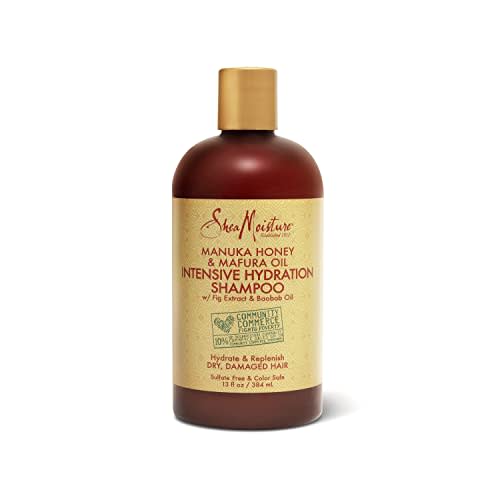
Shea Moisture Manuka Honey and Mafura Oil Intensive Hydration Shampoo $ at Walgreens
Shea Moisture Manuka Honey and Mafura Oil Intensive Hydration Shampoo $ at CVS
Shea Moisture Manuka Honey and Mafura Oil Intensive Hydration Shampoo $ at Amazon
Dove Dermacare Scalp
If you struggle with dandruff or flakes, look for shampoos like this Dove option, which are formulated with pyrithione zinc. Pyrithione zinc, noted King, “has antimicrobial and anti-fungal properties and it also helps with inflammation and itch.” King also said that its “mild” formula is pH-balanced, meaning that it “can decrease yeast on the skin without causing irritation.” (Yeast can cause stubborn dandruff, or flaky patches.) This shampoo has a 4.5-star average rating from 718 reviews on Amazon.
Dove Dermacare Scalp
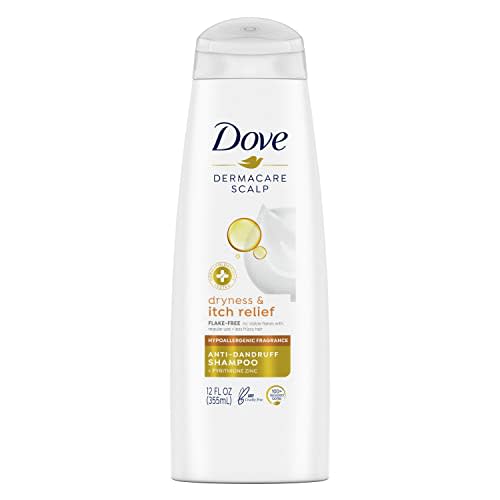
Hairitage Down to the Basics Fragrance Free Shampoo
This shampoo comes recommended by Rose for its “really clean ingredients.” The fragrance-free shampoo should work “for most people,” according to Rose, and gently cleanses hair with gentle cocamidopropyl betaine, rather than harsh sulfates. It is formulated with sunflower seed oil for hydration, according to the brand. It has a 4.4-star average rating from nearly 200 reviews at Walmart.
Hairitage Down to the Basics Fragrance Free Shampoo
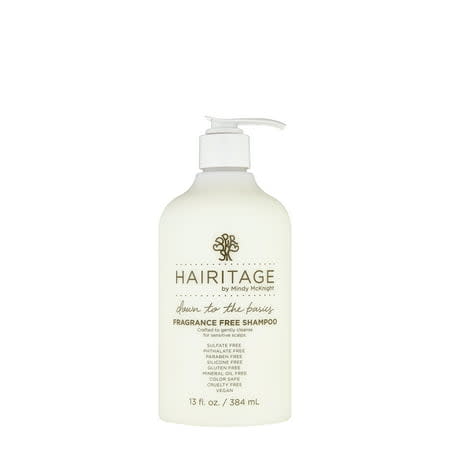
Hairitage Down to the Basics Fragrance Free Shampoo $ at Walmart
Acure Buildup Balancing Hemp & ACV Shampoo
Rose said she “loves” this Acure shampoo. If your scalp is on the oily side and tends to look greasy, this shampoo is formulated with apple cider vinegar, which King says is good at removing excess sebum. It’s also free of harsh sulfates and parabens, which can damage hair. It has a 4.4-star average rating from over 400 reviews on Amazon.
Acure Buildup Balancing Hemp & ACV Shampoo
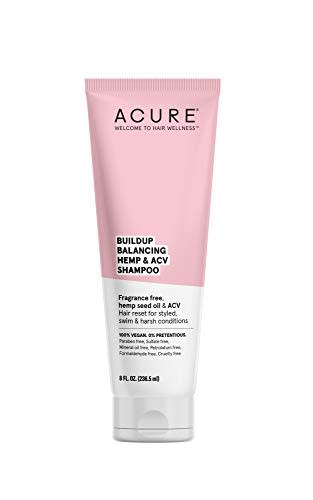
Acure Buildup Balancing Hemp & ACV Shampoo $ at Amazon
Acure Buildup Balancing Hemp & ACV Shampoo $ at Target
Odele Volumizing Shampoo
This Odele shampoo comes highly-recommended by Rose for those who need a shampoo for fine hair. It’s sulfate-free and uses the gentler cocamidopropyl betaine to cleanse, she said.
Odele Volumizing Shampoo
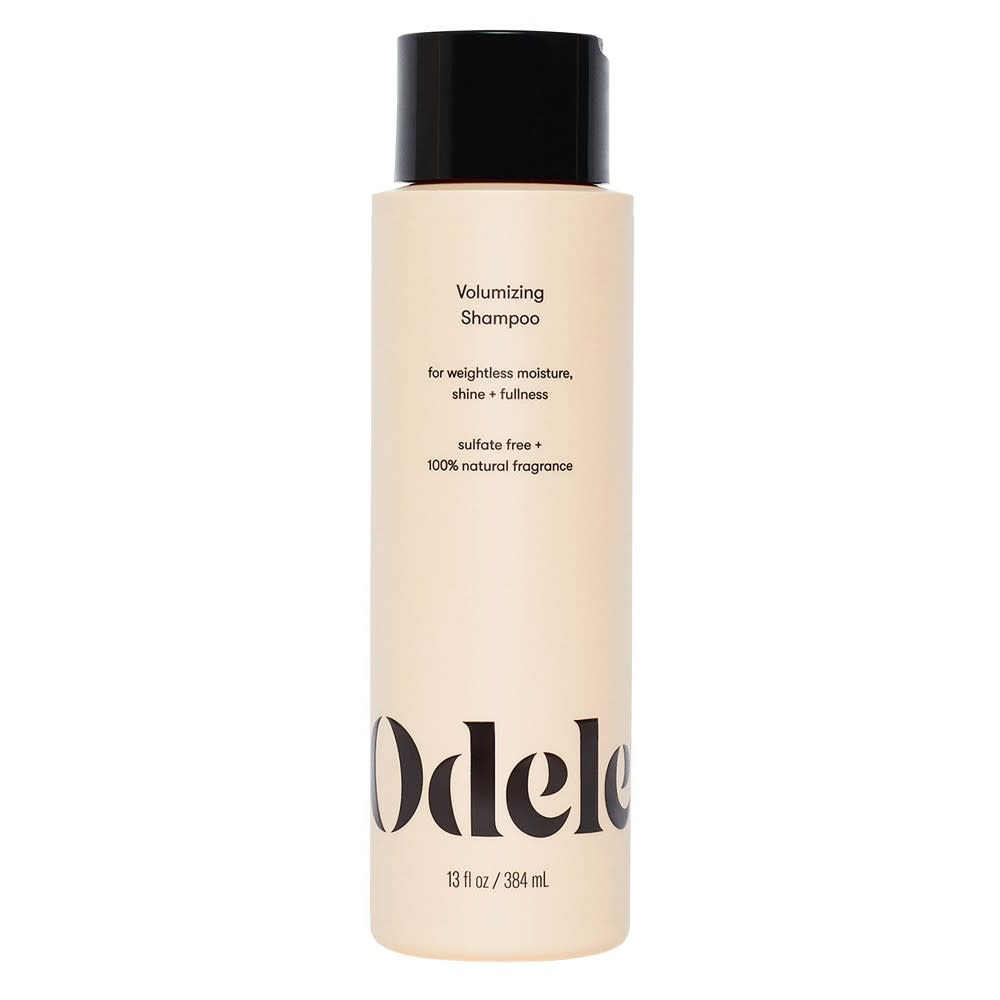
Odele Volumizing Shampoo $ at Target
What’s the difference between a salon quality shampoo and a drugstore option?
The difference between a salon-level shampoo and a drugstore option is in the fine print. As mentioned, drugstore shampoos often have more fillers like sulfates or excess water — ingredients that “do nothing for the hair's health,” and some can even damage hair over time, said Rose — while Salon-quality products tend to have more beneficial vitamins and minerals. Drugstore shampoos that have nearly identical ingredients to salon shampoos are typically less concentrated, said Rose, so you’ll need to use more product with each wash.
When she’s in the drugstore, Rose uses the “Think Dirty” app, which scans ingredient lists for toxins or harmful filler ingredients. She typically opts for silicone- and sulfate-free options, which “are becoming more popular in drugstores.”
How often should you wash your hair:
Washing your hair with a quality shampoo is just one step to keeping your hair healthy. The biggest mistake people make, Rose said, is not getting all the shampoo out, “which can clog hair follicles over time.” She recommended splitting your hair into sections while rinsing the shampoo out, to make sure your entire scalp is cleansed.
And how often should you wash your hair? That depends. Rose recommended washing one to two times a week if you have a dry scalp. A normal/balanced scalp should wash about every three days, and a combination scalp (has areas of more oily patches and areas of dry patches) should wash every other day. Lastly Rose recommends those with an oily scalp type should wash daily, or every other day, depending on how your hair looks at the end of the day. If you’re someone who sweats everyday, “you should be washing your hair daily to ensure that sweat isn't clogging your hair follicles,” Rose said.
But beware that the same rules do not apply if you have an inflammatory scalp condition like seborrheic dermatitis, said Gaunitz. Those with scalp issues “should be washing their hair on a daily basis, or the very minimum every 48 hours.”
As for technique, Rose recommended double-cleansing with two rounds of shampoo. The first round “removes any dirt, oil and product build-up on the scalp, while the second round actually cleanses the hair follicles adequately,” she said. Adding in a clarifying shampoo once a week to move buildup is also “a great hack,” said Rose.
How to keep your hair healthy between washes
Using conditioners and cream- or oil-based products helps avoid dryness and breakage, according to King. As we know, harsh detergents like sulfates can “dry out the cuticle, as can hair gels and sprays that contain alcohol or other drying ingredients,” she said.
How you towel dry your hair is important too, said Rose: “Two of the easiest changes you can make for a big difference in hair health are switching to a microfiber towel instead of a regular towel,” and “switching to silk or satin pillowcases,” said Rose. Using gentler fabrics can prevent any damage caused by friction.
If you’re styling your hair after showering, hot or chemical styling tools like flat irons, can also dry out the hair cuticle, increasing the risk of damage and breakage, according to King.
Catch up on Select's in-depth coverage of personal finance, tech and tools, wellness and more, and follow us on Facebook, Instagram and Twitter to stay up to date.
